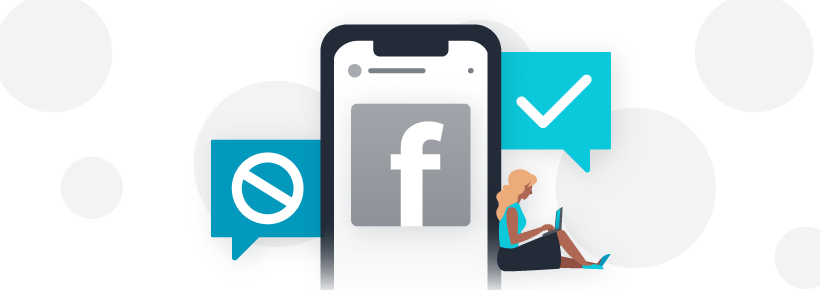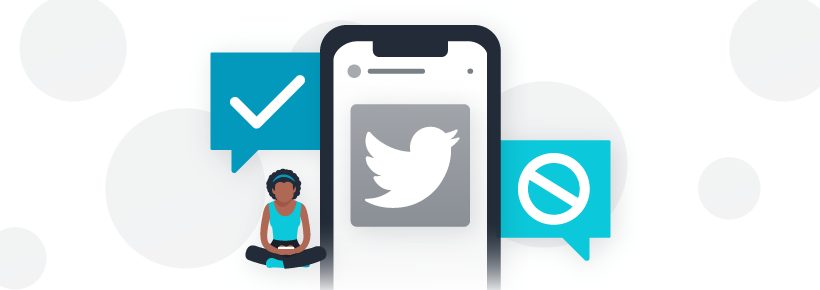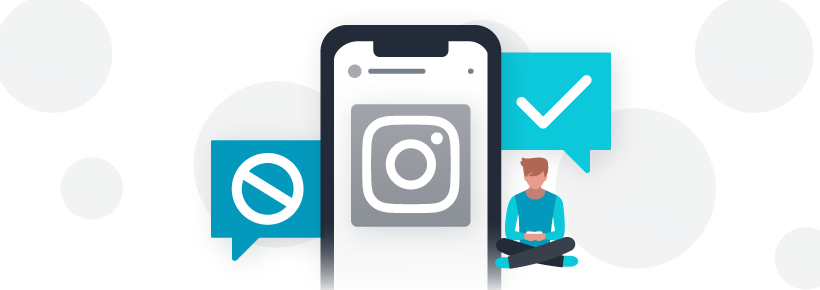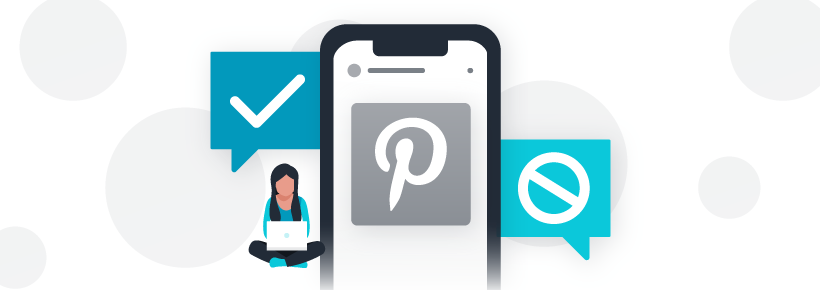As a public relations and digital marketing agency owner, I often hear about numerous tips, tricks, hacks, and workarounds to build massive social media success. Some of them are spot-on accurate, while others may put your brand at risk for violating platform policies. But as a business owner, how do you know for sure which recommendations or tips to follow versus the ones not worth investing time and energy into.
Through a lot of research, direct conversations with platform representatives, and years of overseeing and managing a social media department with various brands across many industries, I am here to help bring clarity (and hopefully peace of mind) to some major tips shared while either confirming or demystifying the claims.

General social media statements to verify or debunk
Here are the top statements that we will prove to be true or false for various social media platforms, including Facebook, Instagram, Twitter, and Pinterest.
Organic content speaks to your current audience, while paid media speaks to potentially new fans.
The Verdict: This is true, and here are our findings.
It’s no secret. Organic content alone reaches 1-6 percent of your current audience. When knowing this data, it’s essential to keep all of this in perspective: 6 percent of 1 million is still a lot of people, while 5 percent of 2,000 is less impressive purely on analytics and data online. However, when considering them as actual people and brand impact, both scenarios are equally important. The size is different, but the significant impact remains the same.
Paid and organic content are the perfect duo together. If your goal is to reach people, consider adding paid media spend into your marketing strategy. Through paid social media, you can target and attract new people to your profile. As you’re attracting potential customers, the next level of your funnel goes into your organic content. Many new followers check out your profile content almost immediately, so funnel them to great organic content.
Paid and organic content together will help your new followers become loyal brand advocates over time.
Comments on social media are irrelevant to the bottom line of the company.
The Verdict: This is false, and here are our findings.
Before the era of social media, advertisers measured success through impressions and estimated reach. Now, through the power and direct access of consumers through digital mediums, you can gain so much more from your advertising. According to Diana Gonimah’s article with Storyful, social media sentiment can significantly impact your overall brand perception.
Gonimah writes, “Brands can harness conversations and content on social media to make informed decisions that protect their reputation.”
Although social media comments appear to be isolated conversations among individuals, they act as word-of-mouth advertising. Social media sentiment can be the difference between your next client or your next bad review.
Follower growth equates to success on social media.
The Verdict: This is false, and here are our findings.
I’ve seen this to be the biggest misconception among senior leadership. To have a massive amount of followers may look impressive, but besides the significant number on the profile, what does it truly mean?
Here’s the short, direct answer: nothing.
Social media followers alone are what we call a vanity metric within the social media industry. It upholds no value by itself. Aside from a number that looks good, a brand should focus on powerful storytelling, cultivating community through engaging with people who take the time to comment (which goes back to statement #2), and actively listening to and reviewing sentiment and data consumption.
The influencer marketing trend is phasing out.
The Verdict: This is false, and here are our findings.
Before we go into our findings, let’s address the basics first. What exactly is influencer marketing? Influencer marketing is essentially the modern-day version of word-of-mouth advertising at scale. Before the era of social media, one would rely on their neighbors, friends, and colleagues’ word or recommendation. Now, this list expands to people we see online who we can relate to and aspire to be in some capacity, from fashion style to business status. Influencer marketing is word-of-mouth advertising amplified.
Now that we have the basics let’s address our findings. According to a recent study by eMarketer, Instagram, which is the leading platform for influencer marketing, is predicted to grow to 117.2 million followers by 2021, and the influencer marketing industry will be worth over $15 Billion by 2021.
Forbes Contributor and Tech Entrepreneur Amine Rahal states, “ When I’m asked if influencer marketing is worth it in 2020, it’s often asked by skeptics who are unaware of market trends and growth projections in the social media advertising space. Recent market research finds that social media influencers will continue to be an invaluable trust-building mechanism that can be tapped to establish brand identity.”
While building a marketing strategy, consider ways you can leverage influencers for the growth of your brand. Before reaching out to the largest influencers in your industry, begin in your own digital backyard. Go through your followers, and you may be surprised to find influencers that follow your brand and engage with your content. Start there! They will not only amplify your brand exposure but bring brand advocacy to the forefront of their messaging as a current fan of your social media pages.
You need to post daily to make an impact.
The Verdict: It depends. Here are our findings.
Before we dive into this statement, please remember that every brand and approach is different. It is a great disservice to any brand if marketers attempt the same content marketing approach across the board. What may work for one brand beautifully may be a nightmare case study for another.
This statement isn’t either false or true. It varies depending upon your data and marketing objectives. Instead of seeking volume, consider the importance of your consistency. Whatever you plan to do, show up and do that consistently. Additionally, the platform can also dictate the answers. For example, A recent HubSpot article suggests posting to 2-5 times per week on LinkedIn while the cadence for Twitter is drastically different due to its chronological, real-time audience consumption.
To make the best decision for your brand, review your data and insights, and examine how your audience consumers your content. If daily posts receive the same amount of engagement as a week of three posts, consider decreasing the volume to align effort with a return. More isn’t necessarily best with social media posts.
Statements for Facebook to verify or debunk
It doesn’t matter if you promote from an official business page or your personal page on Facebook.
The Verdict: This is false, and here are our findings.
Facebook is one of the largest social media platforms, with 2.7 billion active monthly unique users per month. It is arguably one of the most powerful and most controversial platforms for business advertising and consumers. To ensure the protection of its users and the value among advertisers, Facebook is committing to protecting its community while providing tools and resources to businesses to help them succeed and impactful on the platform.
Let’s create an example of this concept and then address the verdict.
Sally is a business owner of a bakery. She has 100 friends on her personal Facebook page and decides it’s easier to promote to her 100 friends directly through her personal page instead of creating an official business page. This is a direct violation of the platform.
Instead, Sally decides to create a business page. After completing the business page, she updates her business profile, including an about section, hours of operation, and her services, highlighting the latest items and promotions. She sends an invitation to her friends through the business page and shares content with her personal from the business page. Sally now abides by Facebook’s terms and conditions and gains access to the advertising tools and resources.
Taking the time to read Facebook terms may seem to be an irrelevant task, but if you own a business, promote a business, or work with clients, you must learn and abide by the official terms noted by the platform. According to Facebook, business promotion from a personal profile is a direct violation, unless it’s shared content. Acknowledging and honoring these terms will save you headaches later.
Statements for Twitter to verify or debunk
Twitter is all about real-time conversations.
The Verdict: This is true, and here are our findings.
If you’re approaching Twitter with the same strategy as Facebook and Instagram, you’re already missing out. Twitter is unlike any other platform from the perspective of real-time updates and trending visibility. According to Brandwatch, Twitter has approximately 500 million tweets per day, which equates to about 6,000 tweets per second. Let that sink in for a second.
With the wrong approach, your content will be buried in a sea of noise. However, with the right strategy, your content has the potential to ride the wave of live engagement with people worldwide. Great tactical ways to increase engagement and visibility on the platform would be through live-tweeting campaigns during virtual events that you’re attending or engaging in socially relevant holidays and observances with others who do the same.
Cut through the chatter with great things to tweet about, and you will experience a considerable impact on the platform.
Statements for Instagram to verify or debunk
Long-form content is best for Instagram.
The Verdict: This is false, and here are our findings.
For people, long-form content works due to relatability and the human connection. For a brand with no human or mascot representation, we’re losing the relatability, which is why this statement is false for brands. According to the Influencer Marketing Hub and the Social Report, the best Instagram captions are less than 125 characters. You read that right.
This may surprise you, but with mobile consumption at an all-time high, and attention spans at an all-time-low, use a long-form content strategy when it matters most. These moments can be product launches, new brand concepts or ideas, or announcing a stand or position on something important to the brand.
Unless you are Brandon with Humans of New York, tread lightly with extended captions and be prepared to shift based on audience sentiment.
Statements for Pinterest to verify or debunk
Pinterest follower growth is an essential factor in the views of your pins.
The Verdict: This is false, and here are our findings.
When viewing your approach and marketing strategy with Pinterest, remember that this platform is more like a search engine and less like a social media platform. People come to the platform not to connect with friends but to build digital vision boards representing where they want their lives to go or be in the future. This is crucial when choosing the type of content to share on the platform and reviewing its data.
Since the platform is more of a search engine, it’s possible to have a small number of followers with higher monthly views. As people search for relatable pins, your brand pins can filter into their search, and they will most likely pin the content before following your profile.
Pinterest is excellent for both B2B and B2C businesses.
The Verdict: This is true, and here are our findings.
Pinterest is another excellent social media platform with an active consumer base of 440 million active monthly unique users. According to the B2B Business Blog of Hubspot, Pinterest is designed to help businesses drive traffic to their website via links, So B2B marketers can strategically create content that builds SEO support and website traffic.
Unlike other platforms, Pinterest is less about followers and more about individual user aspirations, goals, and long-term planning. It’s the digital vision board that users can make a reality. The action happens with each website click, and the platform encourages website visits off-platform.
Among all of these statements, there is a common thread throughout them. Social media is what you make it. Dedicate yourself to being a life-long student of the industry and be open to change (because the algorithm changes are inevitable).
Keep yourself updated on the latest and greatest within the social media industry, and have fun building your campaigns. Regardless of your approach, the learnings are well worth it! Connect with a content strategist about your social media content today.







